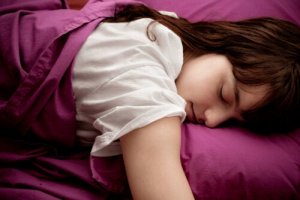Why Aren't Many Teens Morning People?

We all know people who wake up early on their own and feel just fine. At the same time, other people have a very hard time during the morning hours and need time to wake up. These differences have to do with our chronotype, and it doesn’t just have to do with adults. There are also teens that are morning people and others that are night people. Each type of person has their own distinct characteristics and needs.
Given that our teens are still young and under our responsibility, they’re often under the obligation to follow strict schedules. For example, they must carry out a certain daily routine, and we often consider them lazy if they’re unable to comply. However, this isn’t entirely their fault. In fact, part of what’s going on has to do with biological factors that are beyond their control.
Morning people vs. night people: Two chronotypes
A chronotype is the predisposition of each individual to experience highs and lows in activity levels during certain hours of the day. This is based on the synchronization of their circadian rhythm, a physiological 24-hour cycle that regulates our bodies.
A hormone called melatonin controls this energy cycle. This hormone induces sleep and our bodies release it in the dark. Therefore, it determines the moments when we feel more awake and those when we feel more sleepy. However, not all of us release melatonin on the same schedule.

The chronotype of teenagers that are morning people
Adolescents who fall into this category experience a release of melatonin around midnight. Therefore, they need to go to bed early and they wake up feeling refreshed even if it’s early in the morning.
Their most productive hours are during the morning and their energy levels gradually decrease over the course of the day. Finally, when nighttime arrives, they feel tired and fall asleep quickly. By nature, they need to sleep from about 10 o’clock at night until about 6 o’clock in the morning.
The chronotype of teenagers that are night people
At the same time, adolescents that are night people experience a peak in melatonin much later, around 6 o’clock in the morning. Therefore, they wake up feeling sleepy and groggy and need quite a bit of time to wake up completely.
What’s more, their energy levels increase over the course of the day. As a result, they reach their maximum performance level at night. It’s no surprise that they have a hard time falling asleep early. By nature, someone with this chronotype will go to bed around 3 in the morning and wake up around 11 am.
Only about 50% of the population falls into one of these extreme chronotypes. The other half shares a more intermediate chronotype.
Adolescence and the tendency to stay up late
Despite the natural predisposition of each individual, teenagers have an even greater tendency to be night people. From the time our children reach 12 to 13 years of age, they start to become more active during the second half of the day. In the same way, they feel more tired during the early hours.

We all know that society is designed around those who are morning people. School schedules force children to attend class and perform well during the early hours of the day. This comes into conflict with the fact that many teenagers aren’t morning people in the following ways:
- Teens wake up feeling sleepy and out of it. Yet, they must perform (and are tested) during their least optimal hours.
- They’re unable to fall asleep at night because their energy levels are at their highest. Just the same, they must still wake up early the next day. This leads many teens to build up a lot of exhaustion due to lack of sleep.
- Therefore, teens make up for this during the weekend, sleeping for long hours. This keeps them from establishing an organized routine and affects their performance during the week.
All of these situations have a greater effect on those teens who share the chronotype of night people. This is because it offers them unequal opportunities in comparison to their peers that perform better during the day. Their classmates that are morning people learn and take tests during their hours of maximum performance… but the case isn’t the same for those who are night people.
Recognizing and respecting both morning people and night people
In conclusion, we must recognize the chronotypes of our children in order to understand their needs. If they stay awake until all hours of the night and have a hard time waking up in the morning, we need to understand that this is a normal process during adolescence. What’s more, if they tell you they study better at night, believe them. They may just be a night person.
We can’t change the rigid schedules that society imposes on us. Therefore, we must try, as much as possible, to take advantage of our moments of maximum performance in order to be most productive.
We all know people who wake up early on their own and feel just fine. At the same time, other people have a very hard time during the morning hours and need time to wake up. These differences have to do with our chronotype, and it doesn’t just have to do with adults. There are also teens that are morning people and others that are night people. Each type of person has their own distinct characteristics and needs.
Given that our teens are still young and under our responsibility, they’re often under the obligation to follow strict schedules. For example, they must carry out a certain daily routine, and we often consider them lazy if they’re unable to comply. However, this isn’t entirely their fault. In fact, part of what’s going on has to do with biological factors that are beyond their control.
Morning people vs. night people: Two chronotypes
A chronotype is the predisposition of each individual to experience highs and lows in activity levels during certain hours of the day. This is based on the synchronization of their circadian rhythm, a physiological 24-hour cycle that regulates our bodies.
A hormone called melatonin controls this energy cycle. This hormone induces sleep and our bodies release it in the dark. Therefore, it determines the moments when we feel more awake and those when we feel more sleepy. However, not all of us release melatonin on the same schedule.

The chronotype of teenagers that are morning people
Adolescents who fall into this category experience a release of melatonin around midnight. Therefore, they need to go to bed early and they wake up feeling refreshed even if it’s early in the morning.
Their most productive hours are during the morning and their energy levels gradually decrease over the course of the day. Finally, when nighttime arrives, they feel tired and fall asleep quickly. By nature, they need to sleep from about 10 o’clock at night until about 6 o’clock in the morning.
The chronotype of teenagers that are night people
At the same time, adolescents that are night people experience a peak in melatonin much later, around 6 o’clock in the morning. Therefore, they wake up feeling sleepy and groggy and need quite a bit of time to wake up completely.
What’s more, their energy levels increase over the course of the day. As a result, they reach their maximum performance level at night. It’s no surprise that they have a hard time falling asleep early. By nature, someone with this chronotype will go to bed around 3 in the morning and wake up around 11 am.
Only about 50% of the population falls into one of these extreme chronotypes. The other half shares a more intermediate chronotype.
Adolescence and the tendency to stay up late
Despite the natural predisposition of each individual, teenagers have an even greater tendency to be night people. From the time our children reach 12 to 13 years of age, they start to become more active during the second half of the day. In the same way, they feel more tired during the early hours.

We all know that society is designed around those who are morning people. School schedules force children to attend class and perform well during the early hours of the day. This comes into conflict with the fact that many teenagers aren’t morning people in the following ways:
- Teens wake up feeling sleepy and out of it. Yet, they must perform (and are tested) during their least optimal hours.
- They’re unable to fall asleep at night because their energy levels are at their highest. Just the same, they must still wake up early the next day. This leads many teens to build up a lot of exhaustion due to lack of sleep.
- Therefore, teens make up for this during the weekend, sleeping for long hours. This keeps them from establishing an organized routine and affects their performance during the week.
All of these situations have a greater effect on those teens who share the chronotype of night people. This is because it offers them unequal opportunities in comparison to their peers that perform better during the day. Their classmates that are morning people learn and take tests during their hours of maximum performance… but the case isn’t the same for those who are night people.
Recognizing and respecting both morning people and night people
In conclusion, we must recognize the chronotypes of our children in order to understand their needs. If they stay awake until all hours of the night and have a hard time waking up in the morning, we need to understand that this is a normal process during adolescence. What’s more, if they tell you they study better at night, believe them. They may just be a night person.
We can’t change the rigid schedules that society imposes on us. Therefore, we must try, as much as possible, to take advantage of our moments of maximum performance in order to be most productive.
All cited sources were thoroughly reviewed by our team to ensure their quality, reliability, currency, and validity. The bibliography of this article was considered reliable and of academic or scientific accuracy.
- Escribano-Barreno, C., & Díaz-Morales, J. F. (2013). Rendimiento académico en adolescentes matutinos y vespertinos. Revista Iberoamericana de Diagnóstico y Evaluación-e Avaliação Psicológica, 2(36), 147-162.
- Henry-Benítez, M., Díaz-Mesa, E., Yelmo-Cruz, S., & Gracia-Marco, R. (2013). El cronotipo como modulador de los niveles séricos diurnos de melatonina. Actas esp. psiquiatr, 41(3), 149-153.
This text is provided for informational purposes only and does not replace consultation with a professional. If in doubt, consult your specialist.








